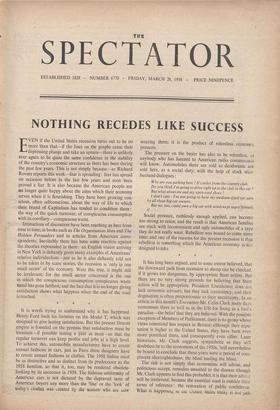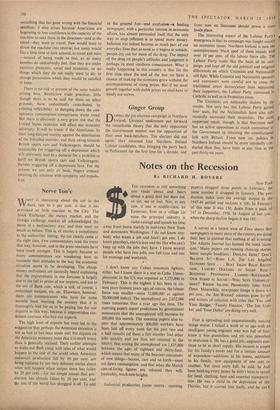NOTHING RECEDES LIKE SUCCESS
EVEN if the United States recession turns out to be no more than that—if the lines on the graphs cease their depressing plunge and take an upturn—there is unlikely . ever again to be quite the same confidence in the stability of the country's economic structure as there has been during the past few years. This is not simply because—as Richard Rovere reports this week—fear is spreading : fear has spread on occasion before in the last .few years and soon been proved a liar. It is also because the American people are no longer quite happy about the aims which their economy serves when it is flourishing. They have been growing con- scious, often selfconscious, about the way of life to which their brand of Capitalism has tended to .condition them : the way of the quick turnover, of conspicuous consumption with its corollary—conspicuous waste.
Intimations of discontent have been reaching us here from time to time; in books such as The Organisation Man and The Hidden Persuaders and in articles from American corre- spondents. Inevitably there has been some reaction against the theories expounded in them : an English visitor arriving in New York is defiantly given many examples of Americans' relative individualism—just as he is also defiantly told not to be taken in by scare stories; the recession is 'only in one small sector' of the economy. Were this true, it might still be irrelevant; for the small sector concerned is the one in which the conspicuous consumption /conspicuous waste trend has gone farthest; and the fact that it is no longer giving satisfaction shows what happens when the end of the road is reached.
* * *
It is worth trying to understand why it has happened. Henry Ford built his fortunes on the Model T, which was designed to give lasting satisfaction. But the present Detroit empire is founded on the premiss that satisfaction must be transient—if possible lasting a year at mosf—so that the regular turnover can keep profits and jobs at a high level. To achieve this, automobile manufacturers have to create annual fashions in cars, just as Paris dress designers have to create annual fashions in clothes. The 1958 finline must be as distinctive and as distinct from its predecessor as the 1958 hemline, so that it, too, may be rendered obsolete- looking by its successor in 1959. The hideous uniformity of American cars is not dictated by the depraved taste of American buyers anymore than the 'line' or the 'look' of today's clothes was created by the women who arc uow wearing them; it is the product of relentless economic pressure. • The pressure on the buyer has also to be relentleSs, as anybody who has listened to American radio commerciais will know. Automobiles there are sold as deodorants are sold here, as a social duty; with the help of stock wile- husband dialogues : •
Why are you parking here ? It's miles from the country club. Do you think I'm going to.drive right up to the club in this car ? But what about me and my open-toed shoes?
I don't care : I'm not going to have my medium-sized car seen by all those big-car owners.
But we, too, could own a big car with windswept super fishtails if
Social pressure, ruthlessly enough applied, can become too strong to resist; and the result is that American families are stuck with inconvenient and ugly automobiles of a type they do not really want. Rebellion was bound to come some time; and one of the reasons for the present recession is that rebellion is something which the American economy is not designed to take.
It has long been argued, and to some extent believed, that the downward path from recession to slump can be Checked, if it grows too dangerous, by appropriate State action. But there are no very strong grounds for believing that State action will be appropriate. President Eisenhower does not lack economic advisers, but they lack consistency; and their dogmatism is often proportionate to their uncertainty. In an article in this month's Encounter Mr. Colin Clark justly flays economists (here as well as in the US) for living in a fool's paradise—the beliefthat they are believed: With the possible exception of Members of Parliament, there is no group whose views command less respect in Britain; although their repu- tation is higher in the United States, they have been even more pontifical there, and consequently even sillier. Later historians, Mr. Clark suggests, sympathetic as they will doubtless be to the economists of the 1950s, 'will nevertheless be bound to conclude that these years were a period of com- placent shortsightedness, the blind leading the blind.'
The risk is not simply that economists will advise, and politicians accept, remedies unsuited to the disease (though Mr. Clark appears to find this probable); it is that their advice will be irrelevant, because the essential need is outside their terms of reference : the restoration of public confidence.
What is happetunt; iu uit ulitteu atates touay nut just
something that has gone wrong with the financial machine; it also arises because Americans are beginning to lose confidence in the capacity of the machine to take them in the direction—and at the speed—they want to travel. Few would want to throw the machine into reverse; but many would like a little time to look around, to stand and stare —instead of being made to feel, as so many families do undoubtedly feel, that they are under constant pressures, social and economic, to do things which they do not really want to do; to change possessions which they would be satisfied to keep.
There is no risk at present of the same trouble arising here. Restrictive trade practices, little though there is to be said for them on other grounds, have undoubtedly contributed, by creating inflexibility, to damping down the con- spicuous consumption /conspicuous waste trend., But there is obviously a very grave risk that the United States recession will affect our economy adversely. It will be ironic if the Atnericans, by their long-delayed mutiny against the domination of the fishtailed monster, and their swing towards British sports cars and Volkswagens, should be responsible for triggering off a depression which will ultim,itely lead to a demand for a prohibitive tariff on British sports cars and Volkswagens, thereby triggering off a depression here. For the present we can only sit back, fingers crossed, awaiting thz outcome with sympathy and trepida- fiat'.











































 Previous page
Previous page